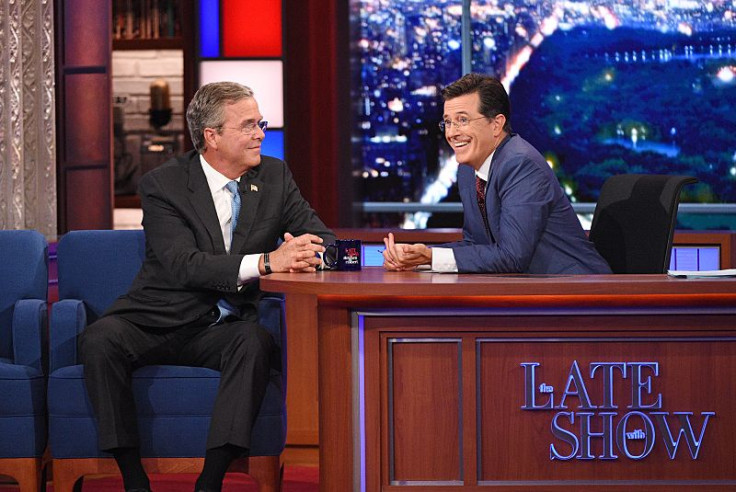CBS Gives Stephen Colbert Coveted Post Super Bowl Timeslot To Battle Jimmy Fallon

Regardless of the teams that will play in Super Bowl 50 on CBS on Feb. 7, a clear winner has already emerged: Stephen Colbert. The network announced Wednesday a live episode of “The Late Show with Stephen Colbert” will follow television’s biggest event.
It’s a calculated move on the part of CBS Corp. Chairman, CEO and President Leslie Moonves to boost the network’s replacement for David Letterman, who, like Letterman, has fallen behind NBC’s "The Tonight Show Starring Jimmy Fallon."
The Super Bowl, routinely watched by more than 100 million people, is the most-watched TV event of the year, giving the show immediately after it a big potential audience that may or may not have seen Colbert in his relatively new role as a late-night host. February will come at the six-month mark for the Colbert iteration of “The Late Show,” and giving it such a high-profile slot is a good way to reintroduce him to the American public with all the kinks worked out in the format of his comparatively new show.
Some speculated the post-Super Bowl slot would be given to the freshman comic-book series “Supergirl,” but sources said the brass wants to throw more support behind “The Late Show,” which makes sense: “Supergirl” is owned by Warner Bros. TV and only licensed by CBS, while the Colbert version of the “Late Show” is owned by CBS, which therefore has a vested interest in building that franchise.
“Supergirl” also hasn’t quite borne out the ratings promise of its first episode, losing 45 percent of its initial audience by the third episode, which aired Monday.
While Colbert hasn’t unseated Fallon, the new host has improved the 11:35 p.m. timeslot for CBS. The ratings among the advertiser-coveted 18-49 demographic are higher now than in the Letterman years, and Moonves said on the company’s third-quarter earnings call last week that late-night ad revenue was up 42 percent for the quarter. Online viewing levels for both shows is crushing that of their predecessors, and, unlike the case of Letterman’s iteration of “The Late Show,” CBS can make money off the series on online platforms.
According to media-buying sources, the problem is that much of this 42 percent increase came from selling advertisements against ratings guarantees that rivaled those of NBC’s Fallon-fronted “Tonight Show,” and Colbert had fallen 56 percent behind Fallon in that crucial 18-49 demographic by mid-October. That means CBS has to give away advertising inventory to make up for the eyeball shortfall, a tough break given the surprising (for these days) robustness of the current TV ad marketplace.
If history is any guide, the Super Bowl won’t solve Colbert’s Fallon problem. While the Super Bowl gives a hefty bump to what follows that night, it doesn’t usually last. Last year, NBC aired “The Blacklist” after Super Bowl XLIX, but the regular episode that aired a mere four days afterward still cratered in a new Thursday timeslot. Shows that have seen a sustained audience spike fall toward the reality-TV end of the spectrum, such as NBC’s “The Voice,” which had its Season 2 premiere after the Giants beat the Patriots 21-17 in 2012.
CBS isn’t necessarily counting on a long-term boost. Post-Super Bowl episodes command some of the highest ad rates on TV (sources say spots in the live “Late Show” could go for $800,000), so regardless of whether Colbert’s “Late Show” gets a true ratings jolt, the network comes out ahead.
© Copyright IBTimes 2025. All rights reserved.






















